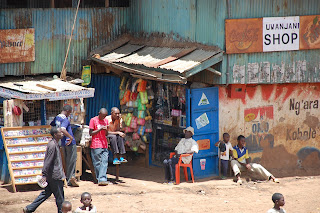 |
| © tkbeyond |
Anyway, back to MOTROW. It stands for Most Of The Rest Of the World—a phrase I've kept using as a catch-all expression. In some circles this was called the "two-thirds world." World missions organizations use the term "majority world." What nations does this include? It's easier to say what it doesn't include—the USA, Canada, Australia, England. Even that list is too broad for what I mean by MOTROW, so let me narrow it down.
 First of all, nations, as the Bible describes them, are called people groups—people with a distinct culture and language (or dialect) regardless of their geographic location or political government. There are thousands and thousands (16,696 to be exact) scattered throughout the world, ranging in population from several thousand to a few million. You can see a list of people groups on the Joshua Project website for a complete index. Over 40% of these people groups are considered unreached with the Gospel, having no Christian witness or community among them.
First of all, nations, as the Bible describes them, are called people groups—people with a distinct culture and language (or dialect) regardless of their geographic location or political government. There are thousands and thousands (16,696 to be exact) scattered throughout the world, ranging in population from several thousand to a few million. You can see a list of people groups on the Joshua Project website for a complete index. Over 40% of these people groups are considered unreached with the Gospel, having no Christian witness or community among them.A real distinction of MOTROW is how the world is seen, called a worldview. MOTROW consists of non-western cultures. By non-western I mean how people think, interact with others, and live out their lives. This has to do with priorities and values. Americans (and similar western cultures) focus on time and tasks—getting a job done and using time efficiently ("time is money!"). MOTROW is focused on people and events, and events are important because of the people involved or celebrated in the events.
For example—in America, a wedding is typically focused on the couple being married, the venue, the style or theme of the wedding, and so on. In MOTROW, the couple are important, but so are family and friends. My first glimpse of this was in the Philippines. On the wedding night following the ceremony and reception, many close friends hung around till late in the evening with the bride and groom in their bridal suite (cottage). Anniversaries, in a similar way, aren't celebrated by the couple alone, but with family and friends. MOTROW is more about community than individuality.
Another distinction is thought process connected to living. In America, we tend to be more concerned with the destination than the journey itself, and with test scores than the usability of what is learned. We, along with most western-oriented cultures, tend to think in a straight line, analytically. This is both a great strength and weakness. Others from around the world (MOTROW) come to America, enrolling in our schools to learn this capacity. It is valuable. It's a weakness when we become so focused and driven that important life realities are neglected—relationships, quality of life, creativity, inspiration, peace of mind and heart, spiritual needs, you get the idea.
So, how does this relate to anyone, especially in America? There's a couple things that come to mind. MOTROW has been moving into the good ol' US of A for the past few decades. There are many people groups living in communities (usually urban areas), often isolated and bewildered by American culture. Thankfully, there are some churches and communities reaching out to them, but not nearly enough to meet these needs. There are great opportunities for reaching the world with the Gospel right here in the US, and many people and ministries are doing so.
The second thing is, most Americans are oblivious to MOTROW—inside America or outside. Our news about the outside world is limited, edited, almost non-existent. The internet has helped, but only if you're looking for world news. Even then, it's still pretty limited. Reading and hearing the news outside the US is quite different. Political and cultural views of the world and America are from a different worldview. Stands to reason, and it gives anyone willing to consider it an opportunity to see things differently.
So, look around wherever you live. There's likely a people group or two from MOTROW near you. Have you already recognized people from MOTROW around you? Have you had any interaction with them? If you're not ready to reach out or help them in some direct way, start praying for them, learn about them (see the Joshua Project website), and eventually engage them. Your perspective on life and the world will change. Your world will expand!


No comments:
Post a Comment